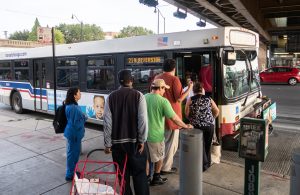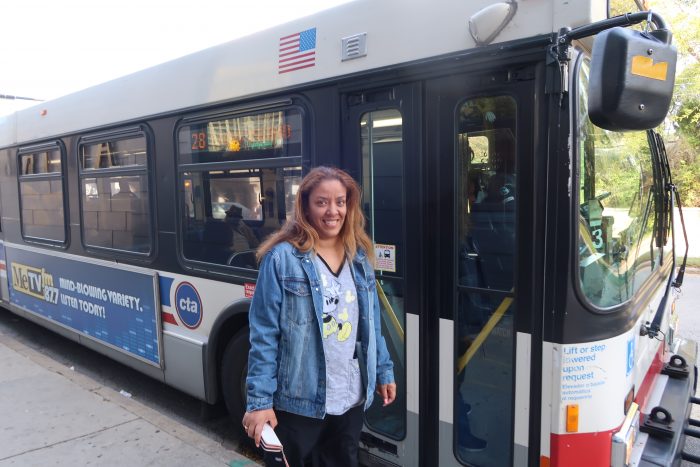Yolanda Cruz lives in the Jeffrey Manor neighborhood on the Far South Side. She works part-time as a health aide in Hyde Park and buys a 7-day pass every week to get to work.
Yolanda knows the 7-day pass is more expensive in the long run than the monthly pass, but the upfront cost of the monthly pass is just too much for her.
“You can’t buy a monthly pass when you have to think about paying your bills,” said Yolanda, pictured left.
Yolanda’s story, unfortunately, is not unique. Stories like hers are at the core of our new campaign.
This week, we are excited to launch our Fair Fares Chicagoland report detailing our research and list of policy recommendations for an equitable transit system. Our recommendations include fare capping, integrating fare collection, and testing the South Cook (Metra Electric and Rock Island) Fair Transit Pilot.
We urge elected officials — including Mayor Lightfoot, Governor Pritzker, and the Illinois State legislature, transit agencies and boards, and county presidents — to take bold action for equitable transit in our region.
Sign up to be a supporter of Fair Fares Chicagoland!
Key Fair Fares recommendations
- Implement fare-capping: A fare-capping policy prevents riders from spending more on multiple single ride passes than they would have if they had purchased a daily, weekly, or 30-day pass. This avoids penalizing residents who cannot pay upfront for a multi-day pass.
- Integrate fare collection: Residents traveling farther away on transit for work often have to transfer between agencies. Fare integration ensures that CTA, Pace, Metra have a seamless, affordable system for transferring between each agency.
- Create a reduced fare program: Create a 50 percent reduced transit fare program for CTA, Pace, and Metra for residents of Cook, Lake, McHenry , DuPage, Will, Kane, and eventually Kendall counties living at or below 200 percent of the federal poverty line.
Nearly 700 residents surveyed on the South and West Sides
Our report includes the results of our survey, which we administered primarily in the South and West Sides, including in Englewood, Gage Park, and Little Village. Local canvassers helped us gather 654 survey responses from residents, which helped us better understand the transit needs of communities of color.
Of the respondents, 441 have an annual income of $25,000 or less. Ninety percent of those respondents said they would more likely use trains or buses if the cost was lower.
In addition to our survey data, we interviewed transit riders like Yolanda to capture their stories and to get a deeper sense of community perspectives on the affordability of transit.
Stories of transit riders
 Based on our conversations and research, we put together a comprehensive list of recommendations that seek to address the inequities in our transit system. We wrote case studies of other cities doing similar work, such as the Fair Fares NYC and ORCA Lift in Seattle.
Based on our conversations and research, we put together a comprehensive list of recommendations that seek to address the inequities in our transit system. We wrote case studies of other cities doing similar work, such as the Fair Fares NYC and ORCA Lift in Seattle.
In our report, we offer estimates for costs, proposals for how to pay for it, and implementation strategies.
Investing in transit is critical
The benefits of accessible, affordable public transportation cannot be ignored, and we believe there is a great need for even more public subsidies to provide equitable fares and increased service to combat some of the biggest issues facing society — from climate change to segregation and institutionalized racism and income inequality.
Barriers to accessing transportation are detrimental to our region. The more interconnected we are, the more prosperous our region becomes.
Please reach out to [email protected] and [email protected] to join the movement for a more equitable fare structure for Chicagoland.

